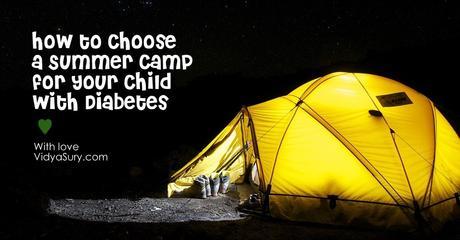
Summer is around the corner and parents, especially working parents, start looking for a safe and enjoyable summer camp where they can send their children.
I was talking to my friend, who lives in the US. She was stressing over how hard it is to find the right summer camp. I wondered why she was fretting, because I'd imagine summer camps would be mushrooming all over the place. Then I remembered! Her daughters were both diabetic and this meant finding one that would take good care of them while helping them reap the benefits of learning important life skills! And of course I started worrying too!
In the months between one school year and another, many boys and girls spend their time in the great outdoors hiking, fishing, swimming, and canoeing at summer camps across the United States. For some children, summer camp is the highlight of their year as they make friends and experience new things. For children with diabetes, summer camp can be especially beneficial. For many, this may be their first time away from home. While this may make both the children and parents a bit anxious about their care and diabetes management, this time away from home can result in lifelong memories.
Surrounded by camp counselors and bunkmates who also have diabetes, campers gain confidence knowing that they aren't alone. And rather than intensive training sessions for diabetes management & education, campers enjoy the traditional recreational activities of summer camp under the watchful, trained eyes of doctors, nurses and adults who can help them enjoy their summer in a safe environment.

So how to choose the right summer camp for a child with diabetes?
Here are some tips:
Tips for choosing a camp-Choose a location. Diabetes-friendly summer camps are located across the United States. If you aren't sure where to start, take a look at the Diabetes Exercise and Camping Association's Camp Finder or the American Diabetes Association's database to find start dates, cost, and more.
-Verify their credentials. When choosing a camp, make sure they are accredited by the American Camping Association and that they follow The American Diabetes Association's guidelines for diabetic summer camps. Having both of these credentials helps ensure that proper medical and safety guidelines are in place.
-Talk to the staff. Talk to the medical director and camp director. Ask them when blood glucose levels are checked, how insulin adjustments are made, and what the policy is for emergency procedures. If your child uses an insulin pump, make sure the staff is familiar with its management and maintenance. Today's touch screen pumps are simple to operate for almost everyone.
- Visit if you can. The Joslin Diabetes Center recommends parents or caregivers visit potential camps at least three times before enrolling. When the camp is not in session, during open house, and when campers are there. This gives you an opportunity to talk with the medical staff, take tours and see first-hand how the camp runs when children are there. You may even want to join in on an activity or two to see how it goes.
A diabetes-friendly summer camp may not be right for every child, every year. For some children and teens who are more adept at managing themselves, this type of summer camp may be a stepping stone to attending a non-diabetes-specific camp the next year. Other children may use this time to become more comfortable and independent managing themselves away from home and translate what they learn into everyday activities like sleepovers with friends or other overnight events.
So, it is important to take the time to explore summer camp opportunities carefully and thoughtfully. Do your research, ask questions, and help ensure that your child makes the most of their summer.
Make summer memorable for your children!

Writer, editor, blogger, social media enthusiast. Love DIY, Coffee, Music, Reading, Photography, Family, Friends and Life. Mantra: Happiness is a DIY Project. In my free time I play with my dust bunnies and show my diabetes who's boss. Tweet as @vidyasury

